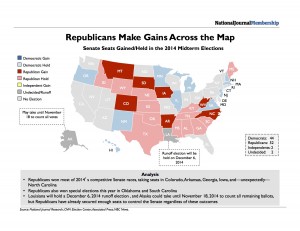January 12, 2015
Top 5 Science Policy Stories of 2014
Posted by Erik Hankin
Written by Erik Hankin, AGU Public Affairs
From “secret science” and “I’m not a scientist” to executive actions and appropriations, 2014 was packed with a variety of science policy news. In a year chockfull of ups, downs, twists, and turns, AGU Public Affairs combed through the news clippings, emails, and tweets to compile a list of our top five Earth and space science policy stories from 2014.
5. America COMPETES Reauthorization
While a number of bills were up for reauthorization last year, few were more important to the American scientific enterprise than America COMPETES. In 2007, and again in 2010, Congress passed bipartisan, landmark legislation that strengthened American global competitiveness through sustained investments in science, innovation, and education. Those two bills authorized several agencies, including the National Science Foundation (NSF) and the Office of Science at the Department of Energy (DOE).
Unfortunately, the reauthorization efforts in 2014 were anything but bipartisan, and roadblocks to progress arose in committee. While the minority members in the House Science Committee looked to pass a bill quite similar to the 2010 legislation, the majority chose to split the DOE programs from consideration; make directorate-level funding allocations for NSF (which had not been done by the Committee’s three previous NSF authorizations); critically cut funding to the geosciences and behavioral and social sciences; and set forth funding levels that provided no real growth for basic research. The majority’s bill, H.R. 4186, the Frontiers in Innovations, Research, Science, and Technology (FIRST) Act of 2014, passed committee on a party-line vote despite an outpouring of opposition from scientific societies and universities.
For more on the FIRST Act and reactions to it, read Rep. Bernice Johnson’s blog post on The Bridge.
4. The Cromnibus
In case you missed it, the federal government did NOT shut down this year! Beltway insiders, federal employees, and national park enthusiasts waited for months with fingers-crossed as the House and Senate appropriators negotiated a spending bill that funds the federal government for the remainder of the 2015 fiscal year (FY15), which ends 30 September 2015. While the numbers aren’t all great for Earth and space science, it is a relief to have reliable funding for the rest of the fiscal year.
For a detailed analysis of the FY15 omnibus bill, please read our post FY15 Omnibus – A Close Shave.

The People’s Climate March was one of many climate change-related headlines in 2014. Credit: NY Daily News.
3. Climate Change
Information and activism about climate change was everywhere in 2014. Two important reports were released: the 2014 National Climate Assessment and the IPCC’s Fifth Assessment Report. More than 400,000 people attended the People’s Climate March in New York City in September, which was followed by many of the world’s leaders debating environmental action at the United Nations climate summit.
But what really made news on the climate policy front was the U.S.-China joint announcement on climate change and clean energy cooperation. The agreement included a new U.S. target to cut net greenhouse gas emissions 26-28 percent below 2005 levels by the year 2025; and the Chinese target to peak CO2 emissions around 2030, if not earlier, and to increase the non-fossil fuel share of all energy to around 20 percent by 2030. The new U.S. goal will double the pace of carbon pollution reduction and keep the country on the right trajectory to achieve economy-wide reductions of 80 percent by 2050.
2. Attacks on NSF
Not long after taking over as Chair of the House Science Committee in 2013, Rep. Lamar Smith (R-TX) began looking into NSF’s portfolio of awards and calling out grants that he and his staff deemed “questionable”. In 2014, Smith ramped up his assault on NSF, issuing a barrage of press releases ridiculing specific awards, championing legislation that would have altered NSF’s peer-review system, and decimating authorized funding for social sciences. Smith also renewed his request to NSF to provide him and his staff with the reviews and program officer analyses for specific grants – this time around, the agency agreed. What followed was a bitter fight between Smith and the committee’s ranking member, Rep. Eddie Bernice Johnson (D-TX) over the Chairman’s compromising of the integrity of NSF’s merit review system, a fight that will continue into the 114th Congress.
AGU issued a letter to Congress in October in staunch support of NSF’s merit review system.

Although it didn’t have a huge impact in 2014, the mid-term election results have major ramifications for 2015 and 2016. Credit: National Journal.
1. Mid-term Elections
While 2015 will be all about the 2016 presidential primary election, it’s important to remember what happened in 2014 – the mid-term elections. November did not go so well for Democrats, with Republicans increasing their lead in the House and overtaking the Senate. The election didn’t make much of an impact science policy-wise in 2014, but the reason it’s number one on our list is its impact on the next two years.
The change of leadership in the Senate means that Republicans now control both chambers, so we will likely see much more legislation being pushed than the last few years. Although with 54 total seats, the Senate is not filibuster proof, nor do Senate Republicans have the numbers to overcome a veto by the president, so any bills passed to Obama’s desk will, in theory, come with some bipartisan agreement.
What is interesting about the new Congress is the opportunity for engagement. The 114th Congress has 12 new senators and 52 new representatives, and the switch in control of the Senate brings new leaders and changes to the top spots on committees. That means plenty of opportunities to inform new members and staff about the exciting opportunities in Earth and space science and its role in developing solutions for our country and our planet.
Read more about the mid-term election in our post So Now What?
And with that, we close the doors on 2014 and begin to look ahead to the 114th Congress, which kicked off at the start of 2015. Check back in on Thursday, 15 January for our post looking at what we expect to see as the top science policy issues in the coming year.


